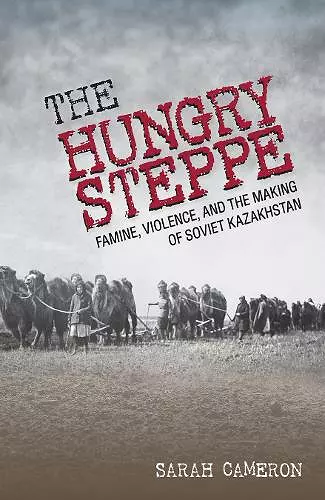The Hungry Steppe
Famine, Violence, and the Making of Soviet Kazakhstan
Format:Paperback
Publisher:Cornell University Press
Published:15th Nov '20
Should be back in stock very soon

The Hungry Steppe examines one of the most heinous crimes of the Stalinist regime, the Kazakh famine of 1930–33. More than 1.5 million people perished in this famine, a quarter of Kazakhstan's population, and the crisis transformed a territory the size of continental Europe. Yet the story of this famine has remained mostly hidden from view. Drawing upon state and Communist party documents, as well as oral history and memoir accounts in Russian and in Kazakh, Sarah Cameron reveals this brutal story and its devastating consequences for Kazakh society.
Through the most violent of means the Kazakh famine created Soviet Kazakhstan, a stable territory with clearly delineated boundaries that was an integral part of the Soviet economic system; and it forged a new Kazakh national identity. But this state-driven modernization project was uneven. Ultimately, Cameron finds, neither Kazakhstan nor Kazakhs themselves were integrated into the Soviet system in precisely the ways that Moscow had originally hoped. The experience of the famine scarred the republic for the remainder of the Soviet era and shaped its transformation into an independent nation in 1991.
Cameron uses her history of the Kazakh famine to overturn several assumptions about violence, modernization, and nation-making under Stalin, highlighting, in particular, the creation of a new Kazakh national identity, and how environmental factors shaped Soviet development. Ultimately, The Hungry Steppe depicts the Soviet regime and its disastrous policies in a new and unusual light.
The Hungry Steppe offers a valuable contribution to the historical record by providing the first painstaking, English-language examination of the Kazakh famine.
(Eurasianet)A valuable addition.... An important first step in ensuring a proper, nuanced account of this neglected event in Soviet and Central Asian history.
(Asian Review of Books)A good work of scholarship can accomplish several things: inform, expand the boundaries of what we know on a subject, make us wiser, and sometimes even move us. Sarah Cameron's excellent book on the Kazakhstan famine of 1930–33 does all these things and more.
(The Russian Review)Cameron is articulate and eloquent, and this is an excellent, lucidly written book.
(Choice)In The Hungry Steppe, Sarah Cameron presents a well-researched and well-written history of the famines and other traumatic experiences that Kazakh pastoralists endured during the first two decades of Soviet rule.
- Mark B. Tauger, West Virginia University (SLAVONIC AND EAST EUROPEAN REVIEW)Sarah Cameron's book is a significant and timely contribution to the historiography of Soviet Central Asia and the debates about the nature of Soviet modernization and nation-building in the national peripheries. Clearly structured and written in a highly accessible style, the book follows the unfolding of one of the worst famines in human history.
(Ab Imperio)Cameron sees the wider significance of her research for the field of Soviet history. Cameron's excellent book will be of interest to the general public as well as specialists in Stalinist economic transformations, state violence, and genocide.
(Journal of Modern Hist- Winner of Southern Conference on Slavic Studies Book Award (formerly Richard Stites Award) 2018 (United States)
- Winner of W. Bruce Lincoln Book Prize 2019 (United States)
- Winner of Reginald Zelnik Book Prize in History 2019 (United States)
- Winner of Harriman Rothschild Book Prize 2019 (United States)
ISBN: 9781501752018
Dimensions: 229mm x 152mm x 21mm
Weight: 454g
294 pages